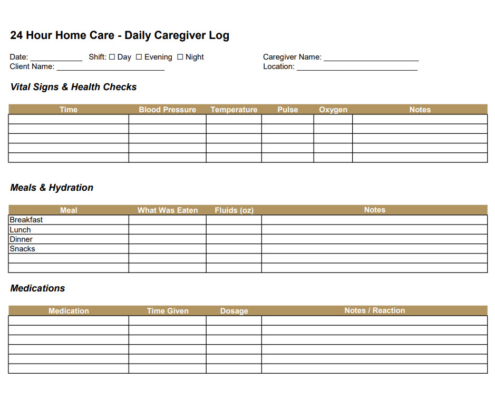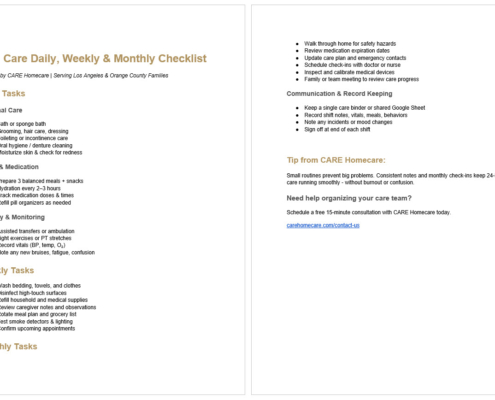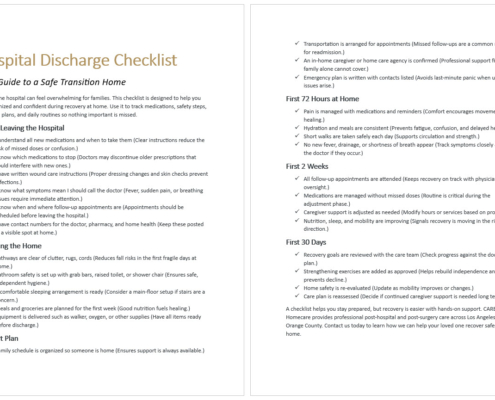A Comprehensive Guide for Dementia Care Caregivers
Dementia is a broad term used to describe a decline in normal cognitive function that affects behavior, thinking, memory, and the overall ability to perform everyday tasks. Alzheimer’s disease, the most common form of dementia, accounts for a majority of cases, roughly 60%-70% of reported cases, impacting millions of individuals worldwide. These conditions not only alter the lives of those diagnosed but also place significant emotional and physical demands on their caregivers.
Providing effective care for individuals with dementia is an important part of enhancing their quality of life and addressing their unique needs. For caregivers, this journey can be both rewarding and challenging, requiring patience, adaptability, and resilience. Without proper support, caregiving can lead to burnout, stress, and feelings of isolation.
This guide on caring for those with dementia focuses on three essential aspects of dementia care: managing daily life with structured routines, creating a safe and supportive home environment, and prioritizing the well-being of caregivers. By exploring practical strategies and actionable tips, this article aims to empower caregivers to understand and navigate the complexities of dementia care while maintaining balance in their own lives.
Contents
Key Takeaways
- Dementia and Alzheimer’s disease are progressive conditions requiring specialized care to address cognitive and behavioral changes effectively.
- A structured daily routine, including regular meals, hygiene, rest, and stimulating activities, helps provide consistency and reduces confusion for dementia patients.
- Use simple language, maintain eye contact, and adopt a calm, positive tone to improve interactions and manage emotional outbursts or repetitive behaviors.
- Home modifications like grab bars, decluttering, improved lighting, and secure locks enhance safety and comfort for dementia patients.
- Address challenges like aggression, wandering, and agitation with patience, redirection, and calming techniques tailored to the individual’s needs.
- Recognize and address caregiver burnout by utilizing respite care options, seeking emotional support, and prioritizing self-care.
- Consider professional care or assisted living when necessary, and ensure legal and financial plans like power of attorney and advanced directives are in place.
- Ongoing education through online tools, workshops, and training programs empowers caregivers to provide informed, effective care.
- Access dementia care resources, support groups, and professional guidance to enhance the caregiving experience and improve outcomes for both caregivers and patients.
Understanding Dementia and Alzheimer’s Disease
Dementia is not a single disease but a general term for a group of symptoms caused by disorders affecting the brain. The term “dementia” encompasses a decline in cognitive abilities, such as memory, problem-solving, and reasoning, that interferes with daily life. Alzheimer’s disease, the most common form of dementia, is a progressive neurological condition characterized by changes in the brain, including the buildup of plaques and tangles that disrupt communication between nerve cells.
While Alzheimer’s accounts for a majority of dementia cases, there are other types, including vascular dementia, Lewy body dementia, and frontotemporal dementia. Each type has unique causes and progression patterns, but they all share the overarching feature of cognitive decline. The distinction between Alzheimer’s and other forms of dementia is primarily rooted in the specific areas of the brain affected and the underlying causes.
Common Symptoms and Early Warning Signs
The early symptoms of dementia can vary but often include subtle changes in memory, thinking, and behavior. People may struggle to recall recent events, misplace items frequently, or have difficulty finding the right words during conversations. Over time, symptoms may progress to impair daily tasks, such as managing finances or preparing meals.
Early warning signs can also manifest as mood swings, withdrawal from social activities, or confusion about time and place. While occasional forgetfulness is normal with aging, consistent and noticeable cognitive lapses may indicate a need for further evaluation.
Effects of Dementia on Patients and Families
The effects of dementia extend beyond the individual diagnosed, significantly impacting families and caregivers. For patients, the condition can lead to feelings of frustration, anxiety, and a loss of independence as their cognitive abilities decline. For families, dementia often brings emotional and logistical challenges, including navigating changes in relationships and adapting to the growing need for support.
The journey of caregiving can be physically and emotionally taxing, as loved ones balance daily responsibilities with the demands of care. These effects highlight the importance of early intervention, education, and the use of resources to support both patients and caregivers in managing the progression of dementia effectively.
Building a Daily Routine for Dementia Care
Creating a consistent daily routine is a cornerstone of effective dementia care. Structure and predictability can reduce confusion, ease anxiety, and help individuals with dementia feel more secure. For caregivers, a well-planned routine provides a framework that simplifies caregiving responsibilities and minimizes stress.
The Importance of Consistency and Structure
A regular daily schedule offers reassurance to individuals with dementia, as it reduces the mental effort required to adapt to constant changes. Familiarity and repetition allow them to better navigate their day, improving overall mood and decreasing the likelihood of agitation. By incorporating memory care tips into routines, caregivers can help reinforce cognitive patterns and provide a sense of stability for their loved ones.
Key Elements of a Routine
Establishing a routine that includes meals, personal hygiene, rest, and activities ensures that all essential needs are met while fostering a balanced day. Meals should be served at consistent times to create predictability and support proper nutrition. Simple strategies, such as offering easy-to-handle foods or reducing distractions during mealtimes, can enhance the dining experience.
Personal hygiene is another vital component of a daily routine. Bathing, grooming, and dressing should be scheduled at regular intervals to maintain both dignity and physical health. A calm, reassuring approach during these tasks helps ease resistance and promotes cooperation.
Rest and sleep are critical for both individuals with dementia and their caregivers. Establishing a fixed bedtime and incorporating calming pre-sleep rituals, such as reading or listening to soothing music, can improve sleep quality and reduce nighttime disturbances.
Activities are equally important, as they keep individuals engaged, encourage physical movement, and provide emotional satisfaction. Balancing stimulating tasks with periods of rest ensures a healthy rhythm throughout the day.
Stimulating Activities for Dementia Patients
Incorporating meaningful and enjoyable activities into the daily routine can bring moments of joy and purpose to individuals with dementia. Physical activities such as walking or gentle stretches promote overall health and help release tension. Music is particularly effective, as listening to familiar songs or participating in sing-alongs can evoke positive emotions and foster connection.
Gardening is another activity that combines physical movement with sensory stimulation. Tasks such as watering plants or arranging flowers are simple yet rewarding. Creative endeavors, such as painting or organizing family photos, can also offer a sense of accomplishment while tapping into preserved memories.
A well-structured daily routine that integrates essential tasks with engaging activities helps individuals with dementia feel secure, supported, and connected to the world around them. For caregivers, it provides a manageable and balanced framework to navigate the demands of dementia care.
Effective Communication with Dementia Patients
Communication is one of the most challenging aspects of dementia care, as cognitive decline often disrupts a person’s ability to express themselves or understand others. For caregivers, these changes can lead to frustration and feelings of helplessness. However, adopting thoughtful strategies can make interactions more meaningful and less stressful for both parties.
Challenges in Communicating with Dementia Patients
Dementia affects language, memory, and reasoning, which can make even simple conversations difficult. Patients may struggle to find the right words, lose track of conversations, or repeat questions multiple times. Emotional outbursts or agitation often occur when they feel misunderstood or overwhelmed. These challenges require caregivers to approach communication with patience, flexibility, and empathy.
Improving Interactions Through Clear and Positive Communication
A few adjustments to how you engage with dementia patients can significantly improve interactions. Maintaining eye contact is a powerful way to establish connection and hold the person’s attention. It shows that you are present and focused on them, which can be reassuring.
Using simple language is essential for clarity. Short sentences and straightforward words help avoid confusion. Instead of asking open-ended questions, which may be difficult to process, use yes-or-no or choice-based questions, such as “Would you like water, tea, or coffee?” This reduces decision-making pressure and fosters easier responses.
Tone of voice also plays a crucial role. Speaking in a calm, positive, and reassuring manner can diffuse tension and create a sense of safety. Avoid raising your voice, even if the person appears frustrated, as this can escalate emotions. A warm and steady tone helps reinforce trust.
Managing Repetitive Questions and Emotional Outbursts
Repetitive questions are common in dementia patients and can stem from anxiety or memory loss. Instead of pointing out that the question has already been asked, respond as if it’s the first time. Offering visual or written cues, such as a calendar or note with the answer, can sometimes help reduce repetition.
Emotional outbursts, such as anger or crying, often occur when a patient feels overwhelmed or confused. Acknowledging their feelings, rather than dismissing them, is the first step to calming the situation. For example, saying, “I can see you’re upset; I’m here to help,” validates their emotions and reassures them. Redirecting attention to a soothing activity, like listening to music or looking through a photo album, can further de-escalate the moment.
By understanding the challenges of communication and applying thoughtful strategies, caregivers can build stronger connections with dementia patients. Effective communication not only improves day-to-day interactions but also helps manage difficult behaviors, creating a more supportive and compassionate caregiving environment.
Creating a Dementia-Friendly Home
Transforming a home into a safe and supportive space is essential for individuals with dementia. As cognitive abilities decline, everyday environments can present hidden risks. Adapting the home ensures safety, reduces anxiety, and promotes independence for dementia patients.
Ensuring Safety and Comfort
A dementia-friendly home minimizes hazards while fostering comfort and ease of movement and navigation. Decluttering is a key first step, as excess items can create confusion and increase the risk of tripping. Pathways should be clear, and frequently used areas such as bedrooms, bathrooms, and kitchens should be easily accessible.
Good lighting is another important element for creating a safe environment. Bright, even lighting reduces shadows and glare, which can confuse dementia patients. Nightlights in hallways and bathrooms can help them navigate during nighttime hours and prevent disorientation.
Secure locks on exterior doors and windows provide peace of mind by preventing wandering while still allowing access to safe outdoor areas. If possible, use locks that are less obvious, such as those positioned higher or lower than eye level, to reduce tampering.
Home Modifications for Safety
Several home modifications can further enhance safety and support daily activities. Grab bars in bathrooms, particularly near toilets and in showers, provide stability and reduce fall risks. Non-slip mats or textured flooring in wet areas also prevent slipping.
In kitchens, childproof locks on cabinets can limit access to dangerous items like cleaning supplies or sharp utensils. Labeling drawers and cabinets with words or pictures can help dementia patients locate items without frustration.
Furniture should be stable and free of sharp edges. Avoid using rugs that are not secured, as they can create tripping hazards. Chairs with armrests provide support when sitting or standing, reducing the risk of falls.
Preventing Wandering and Managing Emergencies
Wandering is a common concern for dementia patients, and implementing preventative measures is critical. Secure outdoor areas, such as a fenced-in yard, allow patients to enjoy fresh air safely. Door alarms or motion sensors can alert caregivers if a patient attempts to leave the home unexpectedly.
For emergencies, it is essential to have a plan in place. Keep an updated list of emergency contacts and medical information readily accessible. Identification bracelets or clothing tags with the patient’s name and contact information can be invaluable if they wander and need assistance returning home.
By making thoughtful adjustments to the home, caregivers can create a safe and supportive environment tailored to the unique needs of dementia patients. These changes not only improve safety but also enhance comfort and foster greater independence.
Caring for a Loved One with Dementia
Caring for a loved one with dementia is a journey filled with both emotional rewards and significant challenges. Whether you are supporting a parent, spouse, or senior family member, balancing caregiving responsibilities with your own well-being is essential. By addressing physical, emotional, and social needs, caregivers can provide meaningful support while navigating the unique complexities of dementia care.
Caring for a Parent with Dementia at Home
Caring for a parent with dementia at home requires striking a balance between their needs and your personal life. The shift in roles, where the child becomes the caregiver, can bring about a mix of emotions, including sadness, frustration, and guilt. Acknowledging these feelings is the first step toward managing them.
To maintain balance, establish clear boundaries and routines that help you manage caregiving tasks while preserving time for self-care. Enlist help from other family members or professional caregivers to share the responsibilities. Remember, seeking support is not a sign of weakness but a vital part of providing the best care possible.
Supporting Seniors with Dementia
Providing care for seniors with dementia involves addressing their physical, emotional, and social needs. Physically, ensure they receive proper nutrition, stay hydrated, and have opportunities for light exercise to maintain mobility. Regular medical check-ups and medication management are also critical components of care.
Emotionally, creating a comforting environment can help reduce anxiety and agitation. Use familiar objects, photos, and music to evoke positive memories and provide reassurance. Socially, encourage interactions with family members and friends, as meaningful connections can enhance their quality of life. Activities like storytelling or reminiscing can foster a sense of belonging and engagement.
Challenges and Solutions in Alzheimer’s and Dementia Care
Caring for individuals with Alzheimer’s or other forms of dementia comes with unique challenges, including managing behavioral changes, memory loss, and declining independence. Agitation, aggression, or withdrawal can be particularly difficult for caregivers to handle. Patience and adaptability are key to managing these behaviors effectively.
To address these challenges, focus on understanding the underlying cause of distress. For example, agitation may stem from pain, hunger, or confusion. By addressing these triggers, caregivers can often alleviate the behavior. Providing a structured day with calming activities can also reduce outbursts and foster a sense of stability.
For memory-related issues, simplify tasks into manageable steps and use visual aids or verbal prompts to guide the individual. Involving them in familiar activities, such as folding laundry or sorting items, can promote engagement while maintaining their sense of purpose.
Caring for a loved one with dementia requires compassion, resilience, and a commitment to their overall well-being. By addressing the physical, emotional, and social aspects of care, caregivers can provide meaningful support while creating moments of connection and joy, even in the face of challenges.
Managing Behavioral and Emotional Challenges
Caring for someone with dementia often means addressing a range of behavioral and emotional changes that can emerge as the condition progresses. These challenges, while difficult, can be managed with understanding, patience, and effective strategies. By learning how to handle these changes, caregivers can create a more supportive environment for their loved ones.
Common Behavioral Changes in Dementia Patients
Behavioral changes such as aggression, wandering, and hallucinations are common in dementia care. Aggression may stem from frustration, pain, or an inability to communicate needs. Wandering often results from disorientation, restlessness, or a desire to find something familiar. Hallucinations, on the other hand, can be linked to changes in perception caused by cognitive decline, leading individuals to see or hear things that are not there.
Recognizing the underlying causes of these behaviors is essential for addressing them effectively. For example, wandering can sometimes be reduced by ensuring the individual is engaged in meaningful activities or by creating a safe and secure environment.
Calming Agitation and Redirecting Focus
Agitation is another common challenge in dementia care. It can be triggered by overstimulation, unmet needs, or changes in routine. To calm agitation, it’s important to approach the individual with a calm and reassuring demeanor. Use a soothing tone of voice and maintain eye contact to show that you are there to help.
Redirecting focus is an effective way to manage agitation or distress. For example, if the person becomes upset, suggest a familiar and enjoyable activity such as looking through a photo album, listening to calming music, or engaging in a simple household task. Distraction techniques can shift their attention away from the source of agitation and create a sense of comfort.
Encouraging Emotional Well-Being
Emotional well-being plays a vital role in dementia care. Reminiscing and storytelling can help individuals feel connected to their past and bring moments of joy. Encourage them to share memories by prompting with family photos or objects that hold significance. These activities not only stimulate cognitive engagement but also foster a sense of identity.
Sensory activities, such as listening to music, touching textured fabrics, or enjoying familiar scents, can also promote relaxation and reduce anxiety. Tailor these activities to the individual’s preferences and abilities, ensuring they feel included and valued.
By addressing behavioral changes with empathy and employing techniques to calm and redirect focus, caregivers can help create a more positive and supportive environment. Encouraging emotional well-being through meaningful activities further enhances the quality of life for individuals with dementia, helping them feel connected, understood, and cared for.
Caregiver Support and Well-Being
Caring for someone with dementia can be both a rewarding and demanding experience, often pushing caregivers to their physical and emotional limits. While prioritizing the well-being of a loved one, it’s essential for caregivers to also care for themselves. Recognizing the signs of burnout and seeking support are crucial steps in ensuring both caregiver and patient thrive.
Recognizing and Addressing Caregiver Burnout
Caregiver burnout is a common yet often overlooked challenge in dementia care. The constant demands of caregiving, combined with emotional strain, can lead to physical exhaustion, anxiety, irritability, and feelings of helplessness. Recognizing these signs early is critical to preventing long-term health impacts.
Addressing burnout begins with setting realistic expectations for yourself. Remember, it’s impossible to do everything alone. Acknowledging the need for help and seeking support is not a sign of failure, it’s a necessary step to maintain your ability to provide care effectively. Regular breaks, proper nutrition, and exercise can also help reduce stress and replenish energy.
Respite Care Options
Respite care offers caregivers temporary relief from their responsibilities, allowing time to rest, recharge, or attend to personal matters. Various respite care options are available to suit different needs:
In-Home Alzheimer’s & Dementia Services
These services bring professional caregivers into the home to assist with daily tasks or provide companionship, allowing family caregivers to take a break while ensuring their loved one receives proper care.
Adult Day Care
These programs offer a safe and engaging environment for dementia patients during the day, providing activities and supervision while caregivers attend to other responsibilities.
Professional Support
Nursing homes or assisted living facilities often provide short-term stays, giving caregivers extended periods of rest while ensuring their loved one receives professional care.
Exploring these options can help caregivers maintain balance while ensuring their loved ones are well cared for.
Emotional Support for Caregivers
The emotional toll of caregiving can be heavy, making it essential to seek emotional support. Joining a support group specifically for family caregivers of dementia patients can provide a sense of community and shared understanding. Sharing experiences with others who face similar challenges can reduce feelings of isolation and provide practical advice.
Therapy is another valuable resource for caregivers dealing with stress, anxiety, or depression. Speaking with a mental health professional can offer a safe space to process emotions and develop coping strategies.
Finding time for self-care is equally important. Engaging in hobbies, spending time with friends, or simply taking a walk can provide much-needed moments of relief. Self-care not only benefits the caregiver but also enhances their ability to provide attentive, compassionate care.
By recognizing the signs of burnout, utilizing respite care options, and seeking emotional support, caregivers can maintain their own well-being while continuing to provide high-quality care for their loved ones. A healthy caregiver is better equipped to navigate the challenges of dementia care and build a supportive, nurturing environment for their family member.
Planning for Long-Term Care
As dementia progresses, the needs of individuals often surpass the resources available within a home setting, requiring thoughtful long-term care planning. This preparation involves evaluating care options, addressing legal and financial matters, and fostering family collaboration to ensure the best outcomes for both the individual and their caregivers.
When to Consider Professional Care or Assisted Living
Deciding when to transition a loved one to professional care or assisted living is a deeply personal and often challenging decision. Indicators that this step may be necessary include increasing difficulty managing daily care, frequent safety concerns such as wandering or falls, and escalating health complications requiring specialized attention. Assisted living facilities or memory care units designed for seniors with dementia offer structured environments and trained staff, ensuring safety and quality of life.
Evaluating senior living options for dementia involves visiting facilities, speaking with staff, and assessing the level of care provided. It’s crucial to involve your loved one, when possible, in the decision-making process, ensuring their preferences and comfort are prioritized.
Legal and Financial Planning for Dementia Care
Proper legal and financial planning is essential to managing the long-term costs and responsibilities of dementia care. Early planning allows individuals with dementia to participate in decisions about their future while easing potential burdens on their families.
Establishing a power of attorney is a key step, granting a trusted individual the authority to make financial and healthcare decisions when the patient is no longer able. Advanced directives are equally important, as they outline the individual’s wishes regarding medical treatment and end-of-life care.
Funding dementia care can be a significant concern. Explore options such as Medicaid, long-term care insurance, and state-specific programs that provide financial assistance for in-home care or assisted living. Consulting a financial advisor familiar with dementia care planning can help families identify resources and create sustainable strategies.
Involving the Family in Care Decisions
Family collaboration is vital when planning for long-term care. Open communication ensures that responsibilities are shared and decisions reflect the best interests of the individual with dementia. Hold regular family meetings to discuss care options, address concerns, and divide tasks such as legal paperwork, transportation to medical appointments, or financial management.
Utilizing dementia care resources, such as support groups or consultations with social workers, can provide valuable guidance during this process. These resources often offer practical advice and emotional support, helping families navigate the complexities of long-term care planning.
Planning for long-term care is a multifaceted process that requires careful consideration and collaboration. By addressing professional care options, organizing legal and financial matters, and fostering open family communication, caregivers can ensure their loved ones receive the comprehensive and compassionate care they need while preparing for the future with confidence.
Educating Yourself About Dementia
Knowledge is a caregiver’s most powerful tool in navigating the challenges of dementia care. Understanding the condition, its progression, and effective care strategies not only enhances the quality of life for dementia patients but also helps caregivers reduce stress and feel more confident in their roles. Ongoing education is essential for equipping yourself with the tools needed to provide compassionate, informed support.
Resources for Learning About Dementia
A wide range of resources is available to help caregivers expand their understanding of dementia and improve their caregiving skills. Online platforms offer a wealth of information, including articles, videos, and webinars designed to address the specific needs of caregivers. Websites like those of the Alzheimer’s Association and National Institute on Aging provide evidence-based insights into dementia care.
Local workshops and community programs are another invaluable resource. These events often offer hands-on training and practical tips for managing day-to-day challenges. They also create opportunities to connect with other caregivers, share experiences, and build a supportive network.
Caregiver training programs, available both online and in-person, are particularly beneficial. These programs cover topics like communication strategies, behavioral management, and creating dementia-friendly environments. Many also include advice on managing caregiver stress and self-care, ensuring you can provide the best support while maintaining your own well-being.
The Role of Ongoing Education
Dementia is a complex condition, and each stage presents unique challenges. Ongoing education allows caregivers to adapt their strategies as the needs of their loved ones evolve. For example, learning about early symptoms of dementia can help caregivers address issues proactively, while education about late-stage care provides insights into managing physical and emotional changes.
Staying informed also plays a crucial role in reducing caregiver stress. Understanding the reasons behind certain behaviors, such as agitation or wandering, can help caregivers approach these situations with patience and empathy. Additionally, knowing that support and resources are available can alleviate feelings of isolation and overwhelm.
Education fosters confidence, empowering caregivers to make informed decisions about care options, safety measures, and effective routines. By continually expanding your knowledge, you can provide higher-quality care while building a foundation of resilience and understanding.
Investing time in educating yourself about dementia is a vital step in becoming an effective caregiver. With access to the right resources and a commitment to ongoing learning, you can navigate the complexities of dementia care with greater confidence and compassion, ultimately enhancing the well-being of both you and your loved one.
In-Home Alzheimer’s and Dementia Care in Los Angeles & Orange County, CA
At CARE Homecare, we specialize in delivering personalized in-home care for individuals with Alzheimer’s and dementia across Los Angeles and Orange County. Our dedicated caregivers provide exceptional support, ensuring your loved ones receive high-quality care in the comfort and security of their own homes. With a commitment to enhancing well-being and improving quality of life, we offer compassionate services tailored to meet the unique needs of each family we serve.
Ready to learn more about how in-home care can benefit your family? Contact CARE Homecare today to explore personalized care solutions that meet your loved one’s unique needs.



















